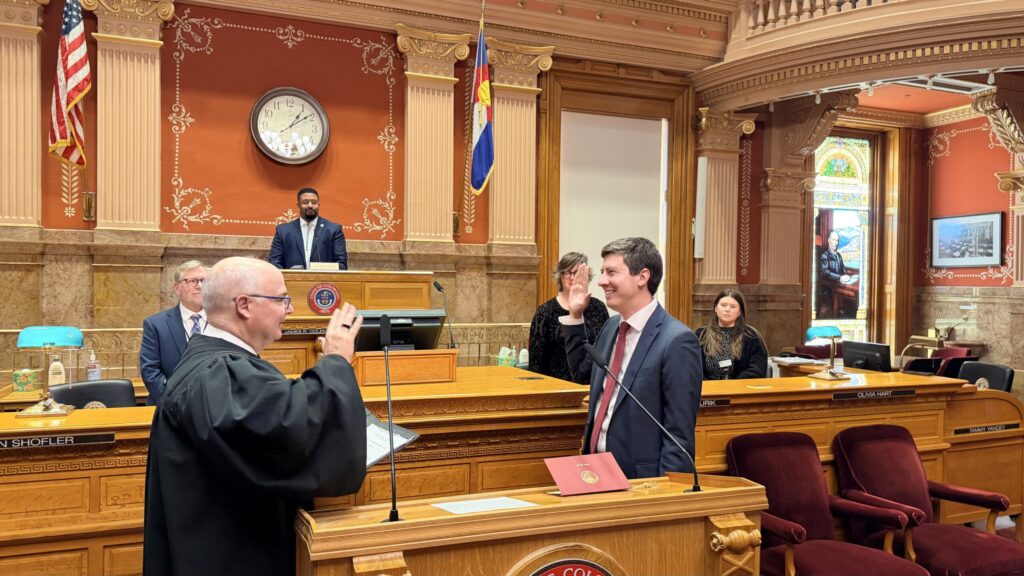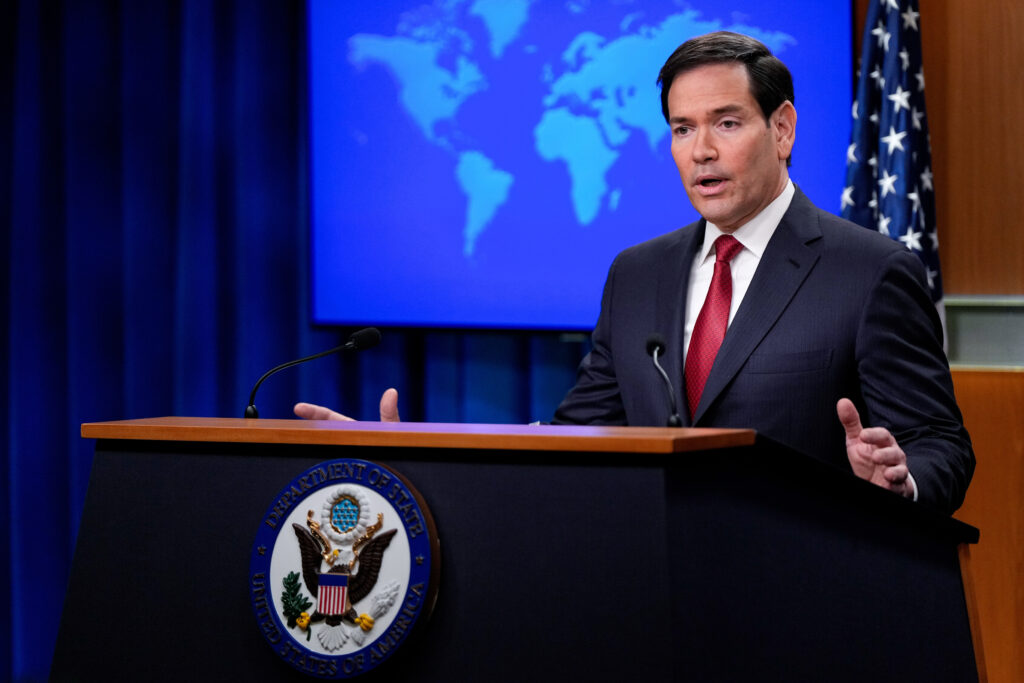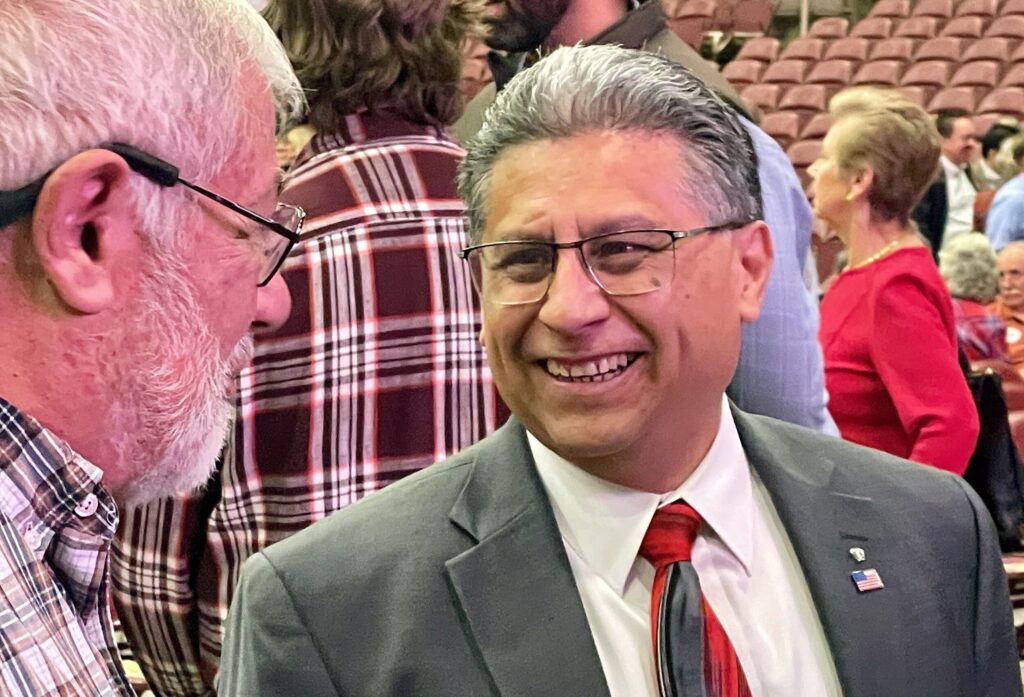Politicos share Israeli insights
Colorado Gov. John Hickenlooper told a crowd of around 1,200 people at the Wings Over the Rockies Air and Space Museum Tuesday night, Nov. 1, that he signed a bill opposed to what is known as the BDS Movement because “it is not the Colorado way.”
The Boycott, Divestment and Sanctions Movement (also known as BDS and the BDS Movement) is a global campaign to increase economic and political pressure on Israel to end their occupation and colonization of Palestinian land and the Golan Heights, full equality for Arab-Palestinian citizens of Israel, and respect for the right of return of Palestinian refugees.
Critics argue the BDS movement deters Palestinian leaders from negotiating with Israel, is antisemitic and a form of anti-semitic anti-Zionism that promotes the invalidation of Israel.
“We’re about collaborating and partnerships,” Hickenlooper said in answer to a question from Larry Mizel. The Mizel Family Foundation was one of the main sponsors of the Jewish Colorado‘s “The Men’s Event,” which also featured several other leading Colorado elected and political officials.
Hickenlooper noted Israel is seen as a leader in cyber-security issues and led a recent state symposium on the subject. He said the U.S. and Israel remain a “crucial partnership,” and said the BDS Movement’s goals are “the opposite of what we need in Colorado and the world.”
Anti-BDS bill targets PERA investments
The bill passed the Colorado House on a 54-10 vote, and the Colorado Senate on a 25-9 tally. Hickenlooper signed House Bill 1284, sponsored by state Rep. Dan Nordberg, R-Colorado Springs, on March 18. According to the fiscal note for the bill, it requires the Colorado Public Employees’ Retirement Association (PERA) to find and list companies that have economic prohibitions against Israel, referred to as restricted companies, by Jan. 1, 2017, and update the list every two years.
PERA is required to tell each restricted company of its status in writing and to remove companies that stop their prohibitions. If a company does not stop its prohibitions within 180 days of being contacted by PERA, the association is required to “sell, redeem, divest, or withdraw (divest) its assets of all publicly traded securities (direct holdings) in the restricted company” within 12 months.
An exception is created if divestments result in the value of all assets falling below 99.5 percent or 50 basis points of the assumed value of the portfolio including restricted companies. While a company is listed as restricted, PERA is prohibited from acquiring direct holdings in it.
Nordberg, in an interview with The Colorado Statesman days later, said he sponsored the bill because Israel is “one of our greatest allies and an important Colorado partner.”
“We have multiple research and development agreements and Colorado has $37 million in commodity exports” to the Middle East nation, he added. “I think to have a state agency seek companies that hurt Israel is bad for Colorado and a bad investment for its many pensioners.”
While there are many pension systems in Colorado, Nordberg said, PERA is the largest, so he wanted to target “the elephant in the room” by singling it out in the bill.
Hancock, Bennett, Gardner support, admire Israel
Also at the event, Denver Mayor Michael Hancock, who recently took his first trip to Israel through a Jewish Colorado program for elected officials and others, said as a political science major in college, he always had a major interest in the strategic importance of Israel.
“To see first-hand what a great state and great country Israel is was something special,” Hancock said. “It’s the birthplace of three main religious faiths and they coexist much better than the media leads us to believe.”
Hancock said he had not been anywhere so constantly under threat of attack, yet the people were “compassionate and humble.”
Norman Brownstein of the Brownstein, Hyatt, Farber, Schreck law firm and another sponsor of the event, asked Democratic U.S. Sen. Michael Bennet what the U.S. should do to work with Israel and lower the impact of terrorism.
Bennet said the U.S. had a lot to learn from Israel about combating things like cyber-terrorism, which he called a great threat to national and world economies.
“Our intelligence sharing is critical and it will take resilience and maturity by politicians to say we will be facing an ever-present threat,” Bennet added. “We can’t play politics when Israel is attacked. We need to improve our defenses so we’re not a soft target, be resilient and work to help Israeli politicians and those in this country come together when things happen.”
Brownstein asked Republican U.S. Sen. Cory Gardner what the U.S. can do in response to a United Nations Educational, Scientific and Cultural Organization (UNESCO) resolution that denies any Jewish historic claim to the Temple Mount and other holy sites in Jerusalem. While the resolution acknowledged Jerusalem to be a holy city for Muslims, Christians and Jewish people, it states that the Temple Mount is “sacred only to Muslims.”
Gardner said the resolution was approved over U.S. objections – and the abstention of 26 countries – and that the U.S. should repeat its reaction to a 2011 UNESCO move.
“We stopped funding UNESCO then and I think when it comes to things like this, or BDS, or any anti-Israeli position, we should say not one more penny of U.S. funds,” Gardner said. “We should stand by our great friend, the great state of Israel.”
Horovitz gives Israeli perspective on U.S. leaders
Keynote speaker David Horovitz, founding editor of “The Times of Israel,” a Jerusalem-based current affairs website, and contributing journalist for the Los Angeles Times and New York Times, was born in Great Britain and immigrated to Israel in 1983.
Horovitz said his main message is “of course the people of Israel want peace. Civilians and children are on the front lines of conflict.”
“They just want credible terms, then there would be a clamor to sign” a peace agreement, he added.
While Horovitz said he would “not march into that political minefield” of the U.S. presidential election, he did note Israel has had good relations with administrations from both sides of the political aisle.
“The common trait is perceived empathy to what Israel is going through,” he added. “And an administration also needs to understand how ruthless the region in which Israel sits can be.”
While many Israelis hoped Republican John McCain would have won the 2008 U.S. election, “Because he knew well the evil men can do” as a military veteran, Horovitz said many others are pleased with President Obama’s views of Israel.
“So now go vote,” he added, without mentioning any presidential candidates in this year’s election.
Horovitz also said he does not see a global determination to tackle global terrorism.
“We will create a better climate for peace by attacking extremists and encourage moderates of all religions in all areas of the world,” he stated. “That means the U.S. and other countries should use every iota of their strength to marginalize extremists and encourage moderation so people are not indoctrinated by hate.”
The U.S. and United Nations deal with Iran over that country’s nuclear program is something many Israelis do not understand, Horovitz said.
“They don’t understand why the U.S. and the others gave up dismantling Iran’s nuclear program instead of just restricting it to peaceful uses,” he added. “There are those who still believe Iran wants to bring North America within rocket range.”
Despite its long and often violent history, Horovitz pointed out that Israel ranked 11th in a worldwide “happiness scale,” while the U.S. ranked 13th.
“I think one thing that helps us in that regard is our insistent democracy, despite having no really great tradition in that area” such as the U.S., Horovitz said. “We certainly believe democracy is worth championing and that the more you understand that, the more you will empathize with Israel.”











